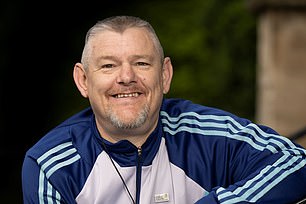I Swear: My Life With Tourette’s by John Davidson (Doubleday £18.99, 304pp)
John Davidson is surely the only person, about to receive an honour from the monarch (in his case an MBE, presented at Holyrood Palace in 2019) and standing just feet from Elizabeth II herself, ever to shout at the top of his voice: ‘F*** the Queen!’

John Davidson
He’d already shouted ‘Bomb! I’ve got a f***ing bomb!’ at the police officers on the gate. But, after a lifetime living with Tourette’s syndrome, John knew how to limit the damage. He made sure to stay away from ornaments on plinths inside the palace (the urge to knock them off would have been overpowering). And he wore tartan trousers rather than the kilt he’d originally considered, as true Scotsmen never wear underwear with a kilt, and ‘knowing I was naked under there would be just too much of a temptation’.
This superb book is an engaging and fascinating account of what it’s like to live with Tourette’s, a condition about which little was known when John was first diagnosed as a child in the 1980s. He’s had to come to terms with the things that were never going to be possible for him, from hide and seek (he kept shouting out) to having a long-term girlfriend: ‘Who wants to stay with someone who calls out another woman’s name when they’re having sex?’ And he gave up sitting in the front seats of cars ‘after grabbing the steering wheel and guiding the car off the motorway at 70 miles an hour’.
John writes that ‘I’m never more than a split second away from saying something that will get me arrested or punched in the face.’ The swearing and excessive honesty (like calling people fat or bald) is bad enough. But there are more unusual tics, like ‘jellyfish sex!’ and ‘I’m a homosexual!’ Though John has learned to turn that second one into ‘I’m a home owner!’
Inevitably the story contains people who don’t ‘get’ John, such as the school bully who punched him and called him ‘Blinker Boy’ (another tic). But what makes the book so much better than the usual ‘woe is me’ misery memoir is John’s awareness of how difficult life must be for those around him. His schoolfriends, for example: ‘I wonder if it was them, or if I felt I had to distance myself. I think it came more from me… They were good lads, my mates, but I could see that I’d started to test their patience… I hated that.’
Thankfully there have been people who do get John. The man who gave him a job on an ice-cream van, the caretaker who let him start working at a community centre, and above all Dottie, who became an unofficial mother after John’s real parents split up. He once called her after he and a friend were thrown off a bus because John had sworn. ‘Before long, an empty bus arrived to pick us up, and it took us all the way back to Galashiels… You don’t mess with Dottie.’
Recent trials of a wristband that delivers electrical stimulation to a nerve have given John hope that his tics might be made more manageable. In the meantime there are the little things, like birdsong: ‘I only notice the birds when my mind quietens down. A rare thing, but when it happens it’s just lovely.’











